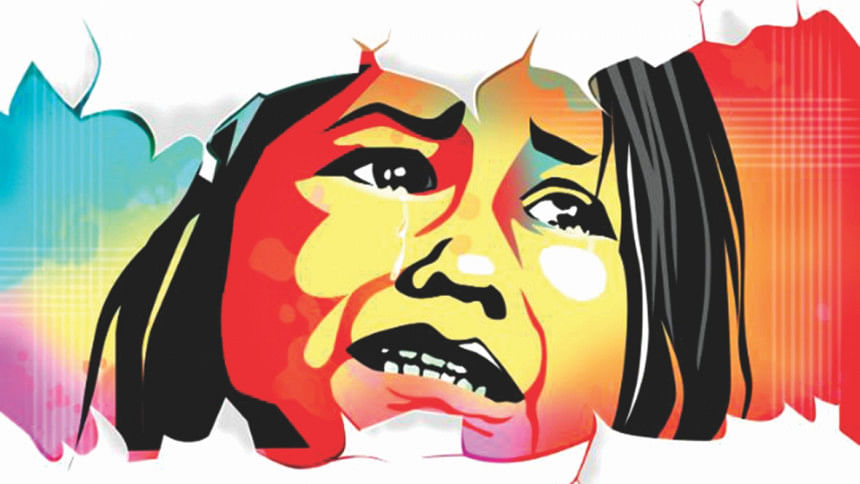The 'village' must ACT NOW

Recently violence against children has been highlighted by print and electronic media of Bangladesh. Media usually report extreme cases of violence (abductions, killings, rapes). According to Bangladesh Shishu Adhikar Forum (BSAF), 1,085 children were killed during 2012-2015. The disturbing trend continues in 2016 (162 children were killed during the first four months of the year). The level of unthinkable brutalities associated with some the killings have stunned the nation. BSAF also reported that 199 children were raped in 2014 and 521 children were raped in 2015. This is based on the reported cases, and is only the tip of the iceberg.
When two siblings were murdered inside their home (allegedly by their mother), media reports mentioned, "Children are not safe even inside their homes." Have children ever been safe in their homes? It is very common for children to be punished by their parents and caregivers. According to the Multiple Indicator Cluster Survey of 2012-2013 (report published by UNICEF and Bangladesh Bureau of Statistics in March, 2015), 82.3 percent children (1-14 years) in Bangladesh experienced psychological aggression or physical punishment during the last one month. There is a government circular (2011) on banning corporal punishment in all settings, but children are facing physical and humiliating punishment in schools regularly. A few cases (especially if the child is badly hurt) get reported by the media, and even then, most of the perpetrators are not brought to justice. When children (both boys and girls) are sexually abused, the perpetrator is usually known to them. Bangladesh has one of the highest rates of child marriage. 64 percent women currently aged 20-24 were married before reaching 18. This is a serious violation of child rights and a form of sexual violence. Working children face violence, abuse, and exploitation by employers. The situation of many of them (especially child domestic workers) should make all of us ashamed, as we let that happen.
Some groups of children remain more vulnerable than others. Trafficked children, children of sex workers, children with disabilities, children of ethnic minority groups, refugee children, children affected by AIDS, children of Dalit (untouchable) groups still face huge social exclusion, stigma as well as discrimination, and have to confront violence in schools, communities and work places.
What could be done to address violence against children? I am reminded of Spotlight - a 2015 American film, which follows The Boston Globe's "Spotlight" team's investigation into cases of widespread and systemic child sex abuse in the Boston area by numerous Roman Catholic priests. The series of stories by the "Spotlight" team earned the newspaper earned the 2003 Pulitzer Prize for Public Service. The story clearly highlights the importance of rigorous follow-up by the media. Media of Bangladesh have reported on violence against children cases, and brought public attention to the crisis. This is something that must be appreciated. But that is not enough. So many cases are reported by media, but for how many do we have follow-ups until the case is closed? This should change. Media should also report on all forms of violence, abuse and exploitation (not only the sensational ones), educate the public on the issues, and hold the government accountable.
One of the major causes of the rise in violence against children is the culture of impunity. Moreover, as a society, we have not been able to learn how to treat children as equal human beings. Due to their age and dependence on adults, many of us think that we can treat them however we want to. Thus, if we are not able to ventilate our frustrations in the work place or are upset about life, instead of confronting an adult, many of us tend to treat a child harshly. It is within this context that we have to understand that some adults have killed children as they were in conflict with their parents. Doesn't this reflect the power dynamics that exist between adults and children in general?
We need an attitudinal shift in the way we view children if we are to protect them from violence. In addition to implementing the existing policies and enforcing the laws, we must make violence against children socially unacceptable. Hence, if my neighbour is beating the child domestic worker, I should not keep silent out of 'courtesy'; I should be able to ring the bell to break that cycle of violence and report to the police. All of us should interact with children within and outside our families in a non-violent way. We should listen to children if they report abuse by anyone including family members, investigate the matter and take actions instead of concealing the incident in order to maintain family honour. If each of us decides that we shall not tolerate violence against children, things will begin to change. Are we doing enough? I am touched by the following quotation by Paulo SérgioPinheiro, the independent expert who led the UN Study on Violence against Children Report to the UN General Assembly in 2007.
"Children are sick of being called the future. They want to enjoy their childhood, free of violence, now!"
If we are really committed to end violence then we should take actions NOW. Spotlight features a lawyer who fought passionately to ensure justice for the survivors of child sexual abuse, and he says: "It takes a village to raise a child" while adding that the entire "village" is also responsible when a child is abused. It is our collective failure that Bangladesh has become such an unsafe place for children. And thus, we have to make it right. The government, parents, caregivers, service providers, national and international NGOs, academia, media - everyone should play their part effectively so that our country becomes 'liveable' for children, and they can grow up to realise their full human potential.
The writer is Director of Child Protection, Save the Children.

 For all latest news, follow The Daily Star's Google News channel.
For all latest news, follow The Daily Star's Google News channel. 



Comments